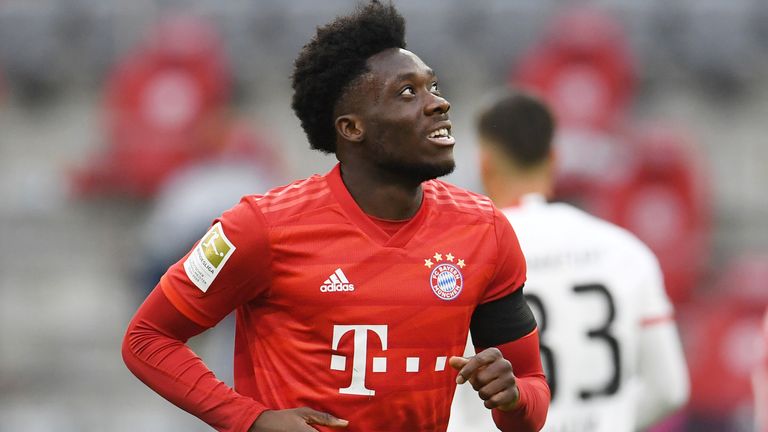Alphonso Davies’ stellar first season at Bayern Munich has brought a league and cup double and now a Champions League winner. But his determination to succeed was forged in an upbringing shaped by war and poverty.
From moving across the world to start a new life aged five, to being chased by Manchester United, to rewriting the books of sporting history in North America and now shining in Germany, here is the story of Alphonso Davies, as told by some of the people who know him best.
“If I look back, where we came from, a refugee camp with no food, no clothes, and now here we are today. I’m proud of him.”
The year is 2000, but there is little fanfare for a new millennium in Buduburam. This Ghanaian refugee camp, often compared to a prison by its residents, is a haven for immigrants from neighbouring Liberia, fleeing a second civil war in a decade.
Most people here have harrowing tales to tell – many too graphic to recall, some to even consider. But one ray of happiness belongs to two of the camp’s newest residents, Debeah and Victoria Davies, who have just given birth to a son, Alphonso.
The thought of bringing up their newborn in their home country, in an environment where carrying a gun has become a necessity, is too much to bear. “At home in Liberia, you had to cross over bodies to go and find food,” Victoria later recalls. “It was very scary. The best thing was to get out.”
You may recognise the name of their child. Less than two decades later, he will light up the Bundesliga and Champions League, dressed in the shirt of one of the world’s most decorated clubs, Bayern Munich – having already been courted by Manchester United even before his professional debut.
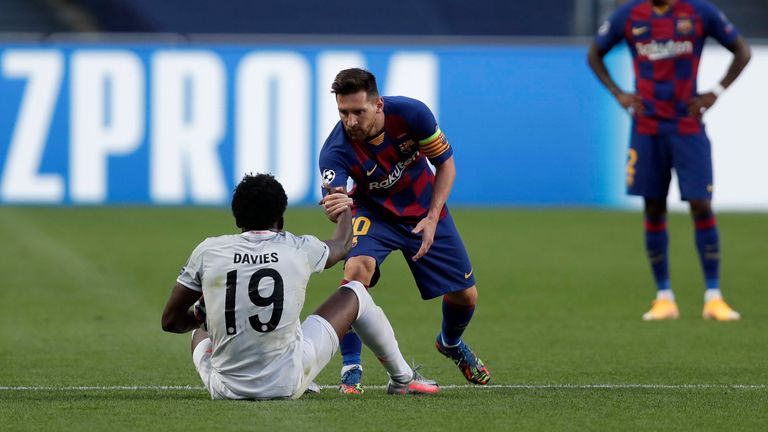
But for the first years of his life, Alphonso Davies will go without school, sometimes with scant food too, with the young family’s minimal income barely enough to support them all.
“It was safe in Ghana,” says Debeah years on, looking back more fondly than he might on the family’s time in Buduburam. “But it was hard to live there. We were worried; people starve in the camp, not just in the war zone.
“For us, we can drink water and sleep. But Alphonso couldn’t make it. Every day we had to make sure we had something for him to make it in life.”
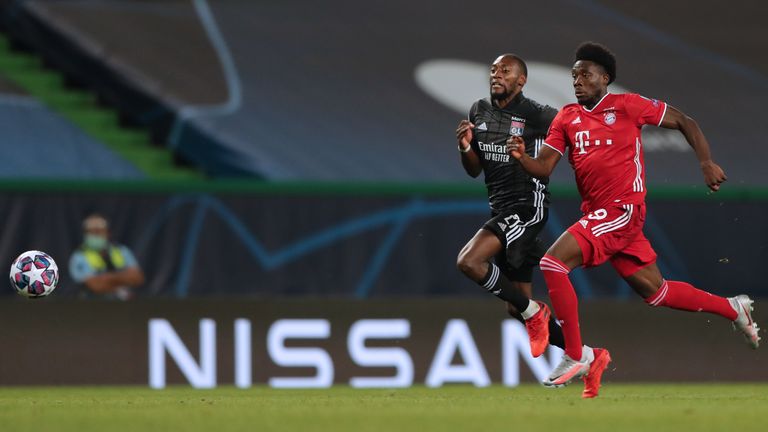
Earlier this season, after a glittering display in Bayern’s demolition of Chelsea, it will take coaxing by striker Robert Lewandowski, a man far more at home in the spotlight, to convince Alphonso to take in the adulation of Bayern’s fans before he disappears down the tunnel.
He will still be the same shy young man who began life in that camp, who has grown and matured with responsibilities few his age ever have to deal with, and forever holding that reminder from his parents – for whom life in Buduburam is all too memorable. How different it all could have been.
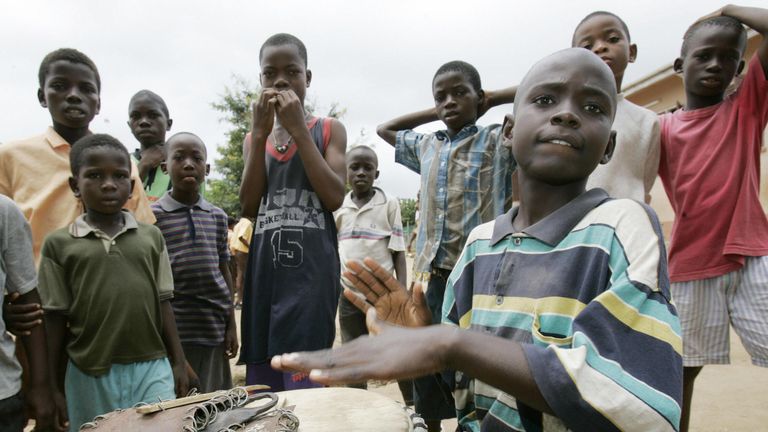
Escape to Canada
It took five years to finally see life outside of Buduburam. The family’s route out of Ghana and poverty came via a place on a re-settlement programme to Canada, where a school-aged Alphonso soon found a love of football.
Having played for a number of teams around his city of Edmonton, Alberta, he joined the Edmonton Strikers, coached by IT professional Nick Huoseh, who had only taken the reins to help his son’s team out when they needed a manager.
“Alphonso was always the quiet one,” Huoseh told Sky Sports. “If I walked into a room, it was like a drill sergeant had just arrived.
“His mum and dad worked all hours of the day since they’d moved to Canada, so when he came back from school, he’d be taking care of his younger brother and sister.
“He was changing diapers before he was a teenager, warming up milk and whatever else. At a very young age, he was taught to be independent and responsible in a way most other 11-year-olds aren’t.”
Of anyone in his career, Huoseh still knows him better than most. “I kind of raised him a little bit,” he smiled.
Alphonso spent as many as five days a week in the Huoseh household while his parents worked and he looked after his young siblings. While in many ways a surrogate carer to his young brother and sister, he could not do it all on his own.
Eventually, Alphonso began to come out of his shell. But he remained a thoughtful, respectful young man – as well as an increasingly talented athlete.
His parents would not let him forget the mantra they had drummed into him as a boy. “I was always talking to him,” said Debeah. “Son, don’t follow bad friends. Don’t be a bad guy. If he joins a bad crew, it’s over to him but I know he’s not going to do that.”
Gaining recognition
That added responsibility, whatever the weight it put on Alphonso, would give him an intangible boost on the pitch as his game developed. Already one of Alberta’s best track sprinters of his age, his footballing technique started to turn heads too.
“He was like a sponge,” said Huoseh. “With his maturity, he would absorb information a lot quicker, and capitalise on it too, a lot better than most of the boys.”
It would not be long before professional clubs, at home and abroad, began to take note.
When the Vancouver Whitecaps offered a 14-year-old Davies a place on their residential academy scheme, his parents were not convinced – but he had earned their trust.
“I was afraid,” Victoria told the club’s YouTube channel. “I had seen some kids on the street, what they’re doing. I didn’t want him to become a bad boy. But he promised me – I will not go to Vancouver and change. I will make you proud.”
By this point, an in-demand Alphonso needed an agent. Hopeful suitors were already sending boots, shirts and other gifts – enough to turn any teenager’s head. But when Huoseh, still helping the family look after their son from a distance, laid the first contract in front of his parents, he was in for a shock.
“Can’t you just do it?” asked Victoria. In spite of the promises of more luxurious gifts and lucrative contracts, it made sense to Alphonso to have Huoseh as a permanent mentor too. So that was that.
One more welcome admirer of Alphonso’s talent was Manchester United’s newly appointed North America scout, Jorge Avial. Here was a man who had watched the likes of James Rodriguez and Freddy Adu come through the ranks. Far from an easy man to impress.
But what started as a vague interest in another talented teenager on YouTube soon intensified when, less than a year after signing for the Whitecaps, Davies became the youngest goalscorer in the history of the USL, the North American second tier, barely 15 years and three months old.
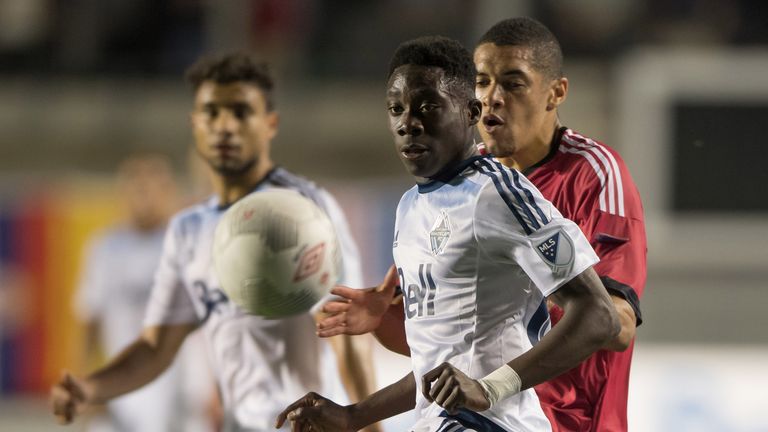
“The first time I saw him it was a quick review, he was very athletic, had tremendous speed,” Avial remembered fondly to Sky Sports.
“He looked good, but just one to keep an eye on. Later, just after I started working for Manchester United, I saw some videos of him when he had just started playing in the USL. Right away I got excited.
“I went to see him play and met up with Alphonso and Nick after the game. We went to a restaurant and from speaking to him, I knew right away he would be big, a big superstar here. I got the same feeling when I discovered Christian Pulisic, and took him to Chelsea for a trial. I told them he was just as good, if not better.”
Interest from Man Utd
There was no doubt in Avial’s mind that Davies had the talent. But where Adu and others he had seen in earlier years had faltered, there was something different about this teenager.
“It was about the kid as a person, as much as his talent,” he said. “I saw he was a young boy wanting to learn, not the usual kid thinking about getting a brand new Porsche. Other kids wanted to become superstars, he just wanted to learn. It’s very rare to see.
“When I believe in a player, I’m one of those guys telling my boss every day. I knew from the beginning he was going to be special, and little by little Manchester United started convincing themselves to look at the kid.”
The Whitecaps knew they had a player on their hands too, and tied Davies down to a professional deal pronto, making him the youngest player in the MLS as a 15-year-old.
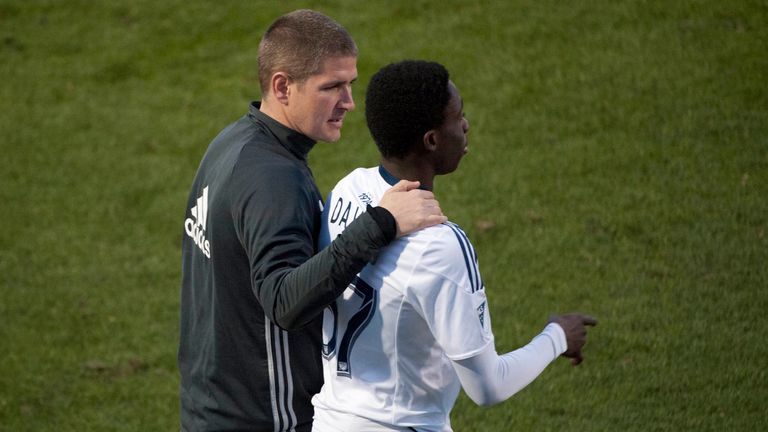
“I’ve seen thousands of players throughout my career, playing and managing, but you just know,” Carl Robinson, who was then Whitecaps head coach, told Sky Sports.
“I thought he had a chance. Getting him into my training for the first time, he was 15 and with seasoned internationals who had played in World Cups. He wasn’t out of place.
“He did things naturally, without me needing to teach him anything. It was one of the fresh things about him.”
As Davies began to make his way in the MLS, Manchester United’s interest soon firmed up but would prove more problematic than hoped. A three-week invitation to train at their Carrington base, organised through Huoseh, was vetoed by the Whitecaps who felt Davies was not ready. But with the teenager shining on the domestic scene, further interest was inevitable.
Bayern a good fit
Huoseh put the feelers out among Europe’s elite – and it was not long before Bayern were in touch with the Whitecaps about their young starlet.
“I met with one or two other clubs, but speaking with the Bayern guys and seeing their plan I thought it was the best place for Alphonso,” he said.
“Honestly, I was being offered things that guys might jump on but Bayern had a small squad, Franck Ribery and Arjen Robben were retiring, and it was just a good fit.
“One of the English clubs, I asked about their plan for Alphonso, and they said they might put him with the second team, or send him on loan because they weren’t sure if he would get a work permit.
“But with Bayern, it wasn’t just a phone call. It was a PowerPoint presentation, put together by [chief scout] Marco Neppe and [sporting director] Hasan Salihamidzic.
“They showed his position on the field, where he was going to play, they showed how they had 19 players in their squad, play 50 something games a year, play a lot of matches a year and the average player plays 80 per cent of the matches.”
In the end, that proved enough to convince player, club and agent that the Allianz Arena was the best place to continue his development. Perhaps it left Manchester United wondering what might have been.
“When Jose Mourinho was there, he really wanted him but it never happened,” added Huoseh. “They waited and waited, and at the end I don’t think they had the same vision and belief as Munich.”
The first half-season following his January 2019 move yielded only 74 minutes in the Bundesliga, a mental stumbling block for a teenager used to breaking records left, right and centre. Huoseh urged Davies to stay patient, having found himself on the sidelines for the first time in what had been an exponential rise to that point.
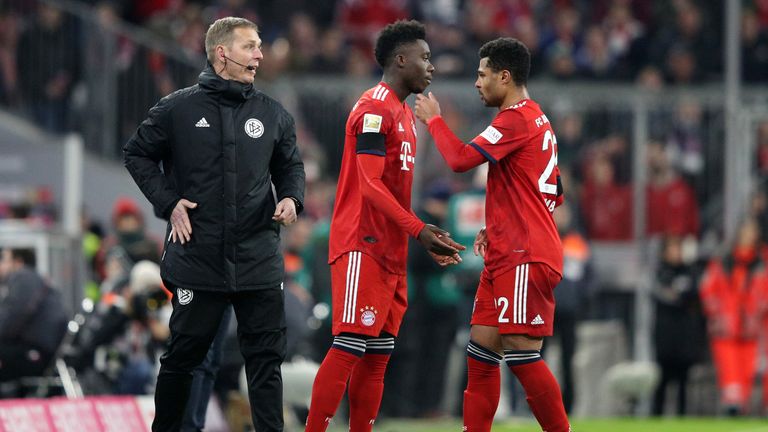
But his chance would come, and more emphatically than he could have ever expected.
Seizing his chance
Injuries to defenders Niklas Sule and Lucas Hernandez in the early weeks of 2019/20 saw left-back David Alaba shifted into the middle of the Bayern defence, and a gap open up in his position. Could Davies’ pace and physicality fit the bill?
One of Niko Kovac’s final actions as head coach was to find out. Although he was sacked within a fortnight of that decision, his parting gift was among the finer ones of his reign.
Assistant Hans Flick took up the reins and kept Davies in the side. He was rewarded instantly. Alphonso was still as spongey as ever, and flourished in his new position.
Davies became a key player for Flick and moved from hot-shot Canadian youngster to one of the world’s brightest talents in a few short months.
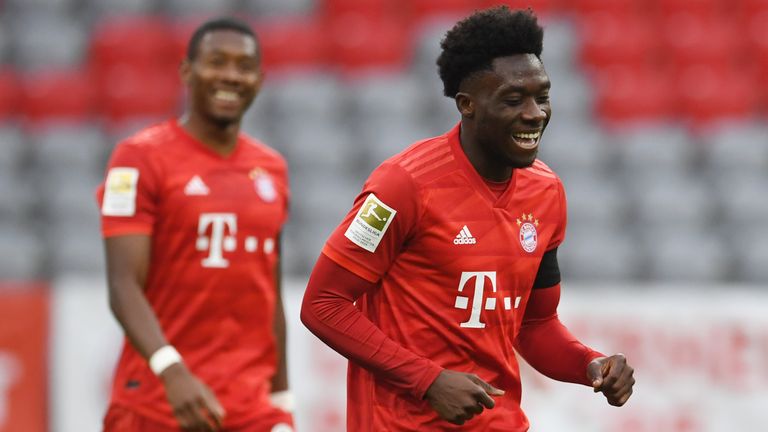
“We didn’t expect it to go this quickly,” Huoseh beamed. “I’ve read in the German papers people saying it’s the best signing Salihamidzic has made. Having coached him as a kid, on and off the field, through to this – it’s worth more than anything.”
That performance at Stamford Bridge in March attracted attention this side of the Channel but Bayern soon cut any rumours off at their source by tying him down to a new deal until 2025.
Club legend Oliver Kahn, now a member of its board, was one of many to add their congratulations to the teenager. “He brings an incredible amount to the table and we are sure that we will still have a lot of joy with him,” he said.
Even such praise from on-high isn’t likely to go to Davies’ head. There is already an ambassador role in the pipeline to work with the United Nations to help improve the lives of refugees like Debeah, Victoria and himself. He is now a proud Canadian international too – and the Porsches are still far from his mind.
“I’m so thankful and grateful for what my parents have done,” said the man himself in a typically quiet, reserved interview. “Throughout the years, they carried the family to a safe environment, a safe country and I’m so happy they did that for us.
“You came from nothing and you’re coming to something. You’ve got to keep that mindset going.”
For all the sacrifices Debeah and Victoria made, all the decisions to give a better life to Alphonso and his siblings, the beaming look of pride on his parents’ faces, and the tears welling up in their eyes, tell you they wouldn’t change a thing.
“I just thank God for his life and his strength,” said Victoria. “I want him to keep on doing what he’s doing. He promised me before he left here. I know he will fulfil that promise.”

